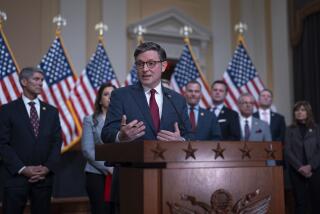White House expands list of woes budget ax could cause
WASHINGTON — Planes delayed. Teachers laid off. And, now, more illegal immigrants slipping past the Border Patrol.
The White House on Monday added to its list of dire consequences it says would come from automatic federal budget cuts scheduled to start Friday, part of a campaign to ignite a public outcry.
For days, President Obama and his aides have been turning up the volume about the effects of the across-the-board cuts, seeking to gain leverage over Republicans in Washington’s latest fiscal fight.
On Monday, Homeland Security Secretary Janet Napolitano predicted longer lines at U.S. border crossings and a more porous border. “Between the ports of entry, if you reduce the number of Border Patrol agents, I think you can say, yes, it does affect our ability to keep out illegal migrants and others trying to enter the country,” Napolitano told reporters at the White House.
Officials issued the warnings as the White House distributed a state-by-state analysis of the effects to governors in Washington for their annual meeting. On Tuesday, Obama will travel to Newport News, Va., a shipbuilding hub already feeling economic pain as the Pentagon delays work on an aircraft carrier.
As he has in past battles with Republicans in Congress, the president hopes public pressure will push his opponents to compromise. In fights over tax rates, payroll taxes and student loans, Obama has succeeded in using that pressure — and his bully pulpit — to force Republicans to bend.
In the latest standoff, in which automatic cuts would gradually curb federal services, Obama is having to work harder to alert the public to the problem, mindful that his bet could backfire. If the budget ax falls and nobody notices, Republicans may have made their case for reducing federal spending.
Republicans, meanwhile, have adopted the strategy of accusing the administration of making the wrong cuts.
After meeting with Obama, some Republican governors suggested the president might be engaging in scare tactics. “It’s time for the president to show leadership,” Louisiana Gov. Bobby Jindal said. “Enough’s enough. There is room to make the cuts without jeopardizing critical services.”
Congressional Republicans complained Monday that the cuts should target wasteful or duplicative programs — or follow their proposals to trim domestic programs, including school lunches and food stamps.
“There is a smarter and better way to go about trying to achieve the reductions in spending,” said House Majority Leader Eric Cantor (R-Va.). “So the president really ought to stop campaigning and come back to the table and work with us.”
But Obama, as he addressed the governors at the White House, suggested that lawmakers were responsible. “These cuts do not have to happen,” he said. “Congress can turn them off any time with just a little bit of compromise.”
After that meeting, White House officials briefed reporters on specific cuts that would hit the states, a list that includes furloughs among civilians working for the National Guard. The report projected that school districts would have to lay off teachers and Head Start would have to trim rolls. Transportation Secretary Ray LaHood spent the weekend warning travelers to expect flight delays as air traffic controllers are furloughed.
Obama mentions little about the origins of the much-hated federal belt-tightening. Both he and Congress approved the blunt, automatic reductions in 2011, hoping lawmakers would decide to compromise on a wide-ranging deficit reduction package to avoid the cuts.
Instead, Republicans and Democrats remain locked in a standoff. Obama and his Democratic allies are demanding that any budget deal include new tax revenue from the wealthy and corporations. Having already raised tax rates on top earners earlier this year, Republicans have refused.
There are no signs of deal-making. Obama phoned congressional Republican leaders last week. House Speaker John A. Boehner (R-Ohio) and Senate Majority Leader Harry Reid (D-Nev.) met almost two weeks ago.
Later this week, the Senate will consider alternative plans from both parties, but they are messaging tools, not solutions. A Democratic proposal would require those earning more than $1 million a year to pay a minimum 30% tax rate. Republicans would cut the federal workforce by making only one new hire for every three vacancies.
Neither is expected to overcome the 60-vote threshold to pass.
kathleen.hennessey@latimes.com
Lisa Mascaro and Michael A. Memoli in the Washington bureau contributed to this report.
More to Read
Start your day right
Sign up for Essential California for news, features and recommendations from the L.A. Times and beyond in your inbox six days a week.
You may occasionally receive promotional content from the Los Angeles Times.








